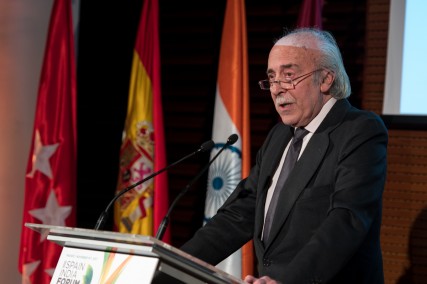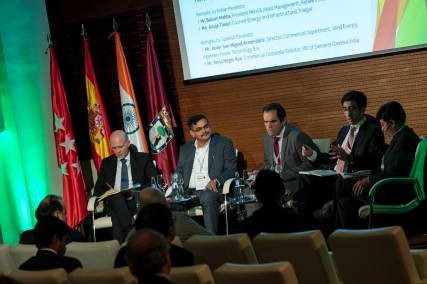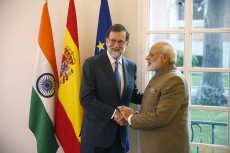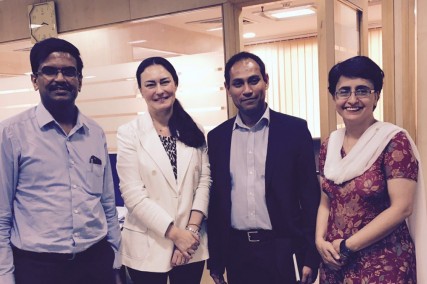The current situation of the energy sector in India and Spain and the outlook for the future were the central topic of the second session of the II Spain India Forum, moderated by Antonio Hernández García, a partner at KPMG. The Indian panellists were Tejpreet S. Chopra, President and CEO of Bharat Light & Power, and Dalip Dua, Managing Director of Krishna Hydro Projects. Spain was represented by Deputy General Director for the Coordination of Climate Change Actions from the Spanish Climate Change Office, Eduardo González, and Carlos Sallé, Chairman of the Energy Commission at the Spanish Chamber of Commerce.
Before the discussion a video was aired, in which European Commissioner for Climate Action and Energy Miguel Arias Cañete shared some ideas on energy policy and the fight against climate change.
After apologising for not being able to attend in person due to agenda issues, Miguel Arias Cañete stressed the importance of the Paris Agreement and his satisfaction in observing that Spain and India “are both committed not only to reaching the goals, but to going further still”.
“I'm glad to see,” he continued, “that on the occasion of the official visit to Spain, Narendra Modi and Mariano Rajoy renewed their commitment to fighting climate change, among other matters, and their support for bilateral cooperation.” The European Commissioner described India as “an all-important partner” for the EU in the energy sector and the field of energy security.
The discussion was then opened by Antonio Hernández García, who explained that Spain and India have different baselines. Energy demand in Spain, as in the rest of Europe, is set to fall over the coming years. The country “has managed to successfully integrate renewables into the energy mix, which now account for over 40% of the total, and is now faced with the challenge of closing down its coal thermal power stations as the proportion of renewable energies rises steadily”, with everything that entails for the stability of the energy grid.
India, on the other hand, will experience an increase in demand of up to 65% in the coming years, and its renewables supply and capacity will increase by 1,000% until 2040, which represents “a massive challenge and a great opportunity”.
The growth of demand in India, according to Tejpreet S. Chopra, is due to the exponential growth of the middle class and the development of megacities (over 15 million people) which place “great pressure on infrastructure”. Bharat Light & Power's CEO stated that India will experience an increase in the domestic use of solar panels: “I believe that the huge transformation that India will undergo will see a change in the business model of how energy is produced.”
Tejpreet S. Chopra also admired Spain's energy mix and its capacity to provide stability with over 40% renewables. “We want to learn how to overcome the intermittence of these energies,” he said.
In this regard, Eduardo González praised the work of Red Eléctrica in managing the network with such a high proportion of renewables, though he also admitted that “we must do more if we want to meet our goals by 2040”.
According to the representative of the Spanish Office for Climate Change, the challenges faced by Spain as a member of the EU include transitioning to a low-carbon economy and an electric vehicle fleet, increasing railway transportation of cargo and boosting energy efficiency in households and industry.
The Chairman of the Energy Commission at the Spanish Chamber of Commerce, Carlos Sallé, also referred to the need to adapt to the fight against climate change and respond to the opportunities that this model, use and production represents: “Cooperation is needed at all levels as the challenge is extremely demanding”.
One of the challenges Spain faces in this field is the fact that hydroelectric generation is at maximum capacity. This is not the case in India, according to Dalip Dua, Managing Director of Krishna Hydro Projects, who considers hydroelectric power to be the sustainable renewable energy par excellence: cheap and with a great return on investment. For Mr Dua, hydroelectric generation is the right renewable source to allow “industry to move away from fossil fuels”.
Regarding cooperation between Spanish and Indian companies, both Tejpreet S. Chopra and Dalip Dua emphasised the importance of Spain as a technological industry leader. Chopra said India could “learn a lot from Spain” in areas such as energy storage, smart grids and smart cities.
Dalip Dua, in turn, described opportunities like the transformation of India's railway network: “There are 44,000 kilometres’ worth of opportunities in the electrification of railway lines. Spain is a cutting-edge country. Why won't they come?”
Indian and Spanish companies can also work together in other markets. “We have large projects pending in East Africa. India and Spain could also work together on these,” he said.
Gallery
Excutive Summary
Dossier II Spain India Forum
Agenda II Spain India Forum
Press release II Spain India Forum
Personal Profiles
II Spain-India Forum introductory video
Video: Spain, world leader in renewable energy






























































